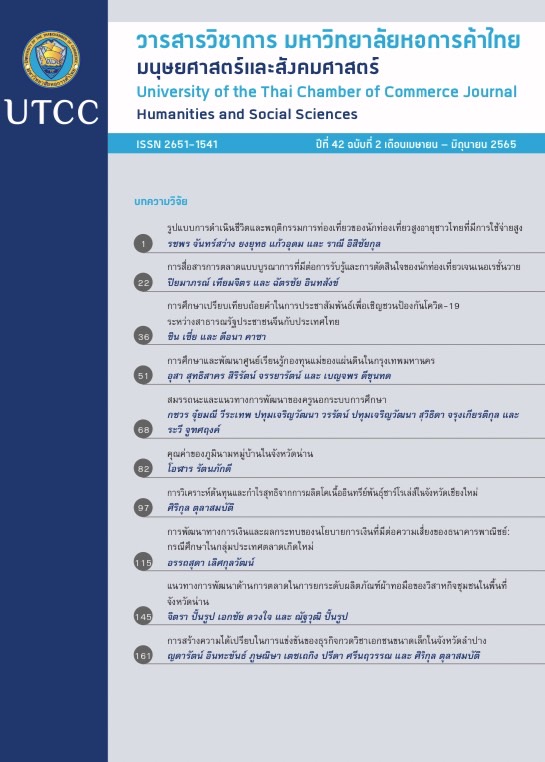Competencies and Development Guidelines of Out-of-school Teachers
Main Article Content
Abstract
The purposes of this research are: 1) to study roles, responsibilities and development needs of out-of-school teachers. 2) to propose and verify key competencies and the development guidelines of out-of-school teachers. This research is supported by Equitable Education Fund, 2020. There were 1,370 out-of-school teacher participants. Data collection was conducted through observation, interview, questionnaires and focus group. The results showed that out-of-school teachers were responsible for five major duties, including 1) searching and identifying the targets 2) sheltering children 3) being a case manager 4) being a collaborator and 5) being a learning facilitator and coach. To successfully perform their duties, six key competencies were 1) student-centered learning consultant and coach 2) media, technology, and learning management 3) law and regulations for cross-cultural equity 4) communication and relationship building 5) case management and 6) morality and professional ethics. The proposed guidelines for out-of-school teachers’ development included evaluation and development planning with three main approaches; training, learning by doing and learning from their own and other experiences. Furthermore, capacity building of out-of-school teachers should be received more support by various organizations to reduce the education inequity of out-of-school students.
Article Details

This work is licensed under a Creative Commons Attribution-NonCommercial-NoDerivatives 4.0 International License.
ลิขสิทธิ์ของบทความ
ผลงานที่ได้รับการตีพิมพ์ถือเป็นลิขสิทธิ์ของมหาวิทยาลัยหอการค้าไทย ห้ามมิให้นำเนื้อหา ทัศนะ หรือข้อคิดเห็นใด ๆ ของผลงานไปทำซ้ำ ดัดแปลง หรือเผยแพร่ ไม่ว่าทั้งหมดหรือบางส่วนโดยไม่ได้รับอนุญาตเป็นลายลักษณ์อักษรจากมหาวิทยาลัยหอการค้าไทยก่อน
References
กองทุนเพื่อความเสมอภาคทางการศึกษา. (2561). สถานการณ์เด็กนอกระบบ. สืบค้นเมื่อ 12 กรกฎาคม 2564, จาก https://oosc-report.firebaseapp.com/
กองทุนเพื่อความเสมอภาคทางการศึกษา. (2563). ประกาศกสศ. เรื่องการสนับสนุนทุนโครงการสนับสนุน
การพัฒนาครูและเด็กนอกระบบการศึกษา ปีการศึกษา 2563. สืบค้นเมื่อ 5 พฤษภาคม 2564, จาก https://www.eef.or.th/notice/858/
จิรประภา อัครบวร. (2561). 100 สูตร(ไม่)ลับพัฒนาคน. กรุงเทพฯ: กรกนกการพิมพ์.
ธนิสร เกษมสันต์ ณ อยุธยา และสุวิธิดา จรุงเกียรติกุล. (2558). การนำเสนอแนวทางการพัฒนาครูการศึกษานอกระบบและการศึกษาตามอัธยาศัยด้านการจัดกระบวนการเรียนรู้ตามหลักสูตรการศึกษาขั้นพื้นฐานนอกระบบ. วารสารอิเล็กทรอนิกส์ทางการศึกษา (OJED), 10(4), 574-584.
ธมล เกลียวกมลทัต, สมเจตน์ ภูศรี, และกฤษกนก ดวงชาทม. (2562). รูปแบบการพัฒนาคุณลักษณะครูในศตวรรษที่ 21 ของโรงเรียนเอกชนจังหวัดชัยภูมิ. วารสารบัณฑิตศึกษามหาจุฬาขอนแก่น, 6(3), 566-579.
Thamonton Jang. (2563, 15 ธันวาคม). กสศ. เผยตัวเลขเด็กนอกระบบการศึกษาในไทยพบกรุงเทพฯ ติดที่ 1 มีจำนวนกว่า 3 แสนคน. BLT Bangkok. สืบค้นเมื่อ 1 กรกฎาคม 2564, จาก https://www.bltbangkok.com/news/31593/
ธันยพร พรมการ. (2560). คุณลักษณะครูในศตวรรษที่ 21 ในโรงเรียนที่มีนักเรียนข้ามวัฒนธรรม จังหวัดเชียงราย. วารสารการวิจัยกาสะลองคำ, 11(2), 95-109.
พงษ์ศักดิ์ ด้วงทา. (2558). สมรรถนะวิชาชีพครูโรงเรียนเอกชนในสังกัดสำนักงานเขตพื้นที่การศึกษาพิษณุโลก เขต 1. Veridian E-Journal, Silpakorn University ฉบับภาษาไทย สาขามนุษยศาสตร์สังคมศาสตร์ และศิลปะ, 8(1), 905-918.
พัชราภา ตันติชูเวช. (2560). แนวทางการจัดการศึกษาสำหรับเด็กและเยาวชนนอกระบบการศึกษา: กรณีศึกษาจังหวัดตาก. สืบค้นเมื่อ 11 กรกฎาคม 2564 จาก https://www.dpu.ac.th/dpurdi/research/485
วีระเทพ ปทุมเจริญวัฒนา, วรรัตน์ ปทุมเจริญวัฒนา, กชวร จุ๋ยมณี, สุวิธิดา จรุงเกียรติกุล, ระวี จูฑศฤงค์, พจนา อาภานุรักษ์, … ดิฐพงศ์ ประเสริฐไพฑูรย์. (2563). รายงานความก้าวหน้า ระยะที่ 1 โครงการสนับสนุนการพัฒนาครูและเด็กนอกระบบการศึกษา กองทุนเพื่อความเสมอภาคทางการศึกษา ปี 2563 โครงการการสนับสนุนและพัฒนากลไกการขับเคลื่อนครูและเด็กนอกระบบการศึกษา. กรุงเทพฯ: จุฬาลงกรณ์มหาวิทยาลัย, คณะครุศาสตร์, หน่วยปฏิบัติการวิจัยเพื่อการพัฒนาด้านเด็กและเยาวชน. (เอกสารที่ไม่ได้ตีพิมพ์).
วีระเทพ ปทุมเจริญวัฒนา, วรรัตน์ ปทุมเจริญวัฒนา, กชวร จุ๋ยมณี, สุวิธิดา จรุงเกียรติกุล, ระวี จูฑศฤงค์, พจนา อาภานุรักษ์, … ปิยวัช ชำนาญกิจ (2564). รายงานฉบับสมบูรณ์ โครงการการสนับสนุนและพัฒนากลไกการขับเคลื่อนครูและเด็กนอกระบบการศึกษา. กรุงเทพฯ: พรรณีพริ้นติ้งเซ็นเตอร์.
วัลนิกา ฉลากบาง. (2560). การวิจัยแบบผสมผสาน. วารสารมหาวิทยาลัยนครพนม, 7(2), 124-132.
สำนักงานคณะกรรมการการศึกษาขั้นพื้นฐาน. (2553). คู่มือการประเมินสมรรถนะครู. สืบค้นเมื่อ 4 มิถุนายน 2564, จาก http://www.tmk.ac.th/teacher/capasity.pdf
สำนักงานเลขาธิการสภาผู้แทนราษฎร, คณะกรรมการร่างรัฐธรรมนูญ. (2561). รัฐธรรมนูญแห่ง ราชอาณาจักรไทย. สืบค้นเมื่อ 3 พฤษภาคม 2564, จาก https://cdc.parliament.go.th/draftconstitution2/ewt_dl_link.php?nid=1038&filename=
สุกัญญา รัศมีธรรมโชติ. (2548). แนวทางการพัฒนาศักยภาพมนุษย์ด้วย Competency. กรุงเทพฯ: ศิริวัฒนา อินเตอร์พริ้นท์.
สุทธิชัย ปัญญโรจน. (2553). เด็กนอกระบบ. สืบค้นเมื่อ 22 กรกฎาคม 2564, จาก https://www.gotoknow.org/posts/416359
อุมาภรณ์ ผ่องจิตต์. (2559). ผู้จัดการรายกรณี (Case Manager) กับงานสังคมสงเคราะห์วิชาชีพ. สืบค้น เมื่อ 21 กรกฎาคม 2564, จาก http://www.dsdw2016.dsdw.go.th/doc_pr/20190821164343.pdf
McClelland, D. C. (1973). Testing for competence rather than for "intelligence". American psychologist, 28(1), 1-14.
UNESCO. (n.d.). Sustainable Development Goal 4 (SDG 4). Retrieved July 25, 2020, from https://sdg4education 2030.org/the-goal.
UNESCO. (2020). Education and Covid-19. Retrieved June 03, 2020, from https://bangkok.unesco.org/index.php/content/education-and-covid-19
Vazirani, N. (2010). Review paper: Competencies and competency model–A brief overview of its development and application. SIES Journal of management, 7(1), 121-131.
Wattanasukchai, S. (2020). Vulnerable and struggling: Society’s poorest families suffering through COVID-19. Retrieved June 03, 2020, from https://www.unicef.org/thailand/stories/vulnerable-and-struggling-societys-poorest-families-suffering-through-covid-19


